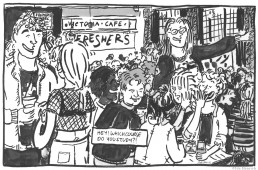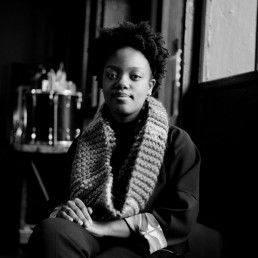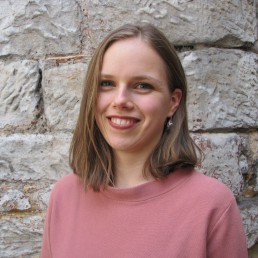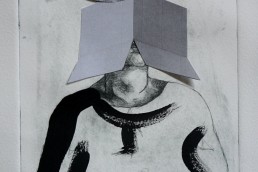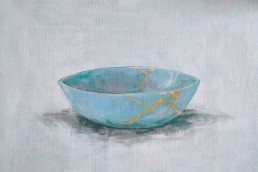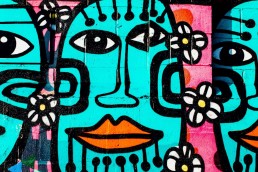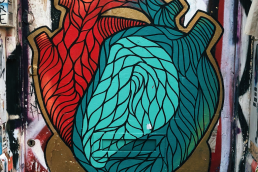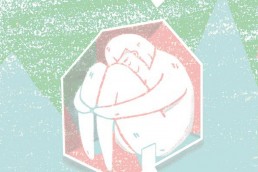Words by Briana Pegado | Comic Art by Ida Henrich
Hitting A Wall
About 20 months ago, I was in tears on the floor in a flat I shared with my partner. We had just broken up after a week-long series of the most unfortunate events in my life. I ran a social enterprise that supported emerging artists and creatives in Edinburgh which was facing a massive deficit; one of our funders had just pulled out during our third week of festival programming. I had budgeted for this, but a venue we worked with then unexpectedly charged us for technical hire costs that had not been properly itemised in the contract I’d hastily signed.
Then the studio I hired made some inconsiderate decisions that left me no choice but to move our base to my flat. Their decisions felt unreasonable given the circumstances. They only had to manage themselves, I had to manage 50 plus volunteers and 500 artists across 15 venues in the city over a month — and every single person supporting me and working with me was on borrowed time.
By the end of this week I’d lost my relationship, my flat, my social enterprise was facing a large deficit, and I was knackered.
A Lifetime of Preparing to Hit A Wall
I lived with depression since I was 7 years old. Panic attacks followed by mild social anxiety — and later on in life low-levels of anxiety –meant I was a high-functioning anxious person. I excelled in community service activities, clubs, and school. I was in an all-girl punk rock band. I played all the sports and I made time for a thriving social life with friends spread all over the country and all over the world. From a very young age in a hypercompetitive environment that was not as literature about mental health as our society is today, I simply channeled my anxiety and depression into overwork. I would have panic attacks in the shower after a long day right after I’d had a rushed dinner after 2.5 hours of sports practice and right before I was about to pile into 5 hours of homework. I often did not get to sleep before 2am and would have to start again the next day.
The culture I grew up in prized competitiveness, overachievement, ambition, perfectionism and hard work with a teensy dose of creativity. Though I found refuge in dance, music, painting and writing even that was made competitive at school. Only the best in our class would get help with their portfolio for art college; the rest simply had to accept that their creativity would become a hobby.
Then I moved to Scotland. I came to Edinburgh for university in 2010. I had aimed to stay involved in creative pursuits like dance, painting and writing but quickly I found these outlets too competitive at university as well. I only had six hours of lectures a week and three hours of tutorials — for the first time in my life I had a break. I had so much time, which I quickly filled with student politics, friends, clubbing, wandering the city, and being an 18-year-old. University was not something I wanted. It was something was told I had to do. It was expected of me, though I was acutely aware of the privilege I had to be able to attend university.
Fast forward four years and a bit. I was elected President of Edinburgh University Students’ Association in 2014, as the first international, black woman President of the union in its 130 year history. Amongst other things in my year as President, I pitched an idea to the university principal which turned into the Edinburgh Student Arts Festival (ESAF), later a social enterprise that would provide a platform to emerging artists and creatives to showcase their work to the public. We had greater ambitions and aspirations to support people to realise their creative potential by working in partnership with Edinburgh City Council in schools to help raise the profile of the creative industries for young people.
Over three years we worked with 1,000 artists/creatives, over 20 partner organisations, over 15 venues, and engaged with over 7,000 members of the public. We were funded by three major Edinburgh-based universities and we had entered into every pitching competition for startups, news ideas, social enterprises and arts businesses. We would often make it to the final round and then lose out to some huge, high growth tech business or a company setting up solar panels in sub-Saharan Africa. What I would quickly learn is that people do not value the arts as much as people within the arts community do. A person will be willing to buy a cinema ticket but to pay for a ticket to hear a slam poet perform a new piece of work, listen to a band they had never heard of, to see some art — nae chance, pal.
All this time I was supported by my partner financially. I lived in a flat he owned and did not always have to pay rent. I had a mother that still supported me financially when I needed it. I was privileged — massively so and in a way that was not uncommon for artists and creatives. All the while I was running this massive organisation I was working two or three freelance jobs. I spent a lot of the time between 2015 – 2017 commuting between Glasgow and Edinburgh, commuting from the city centre down to the Shore in Leith. I worked in theatre, design, drama, social enterprise incubators, events, project management and social media. I often worked 80 hour workweeks. I managed being paid late, sometimes by months. I used nectar points to pay for groceries and borrowed money from friends. I stopped having a social life beyond spending time with my partner, working, and occasionally going to the cinema when I could afford it. I believed in what I did so much it often took up my evenings and weekends. I rarely went on holiday, partly because I could not afford it but partly because our busiest times of year were during the holiday period. I have clear memories of working on a layout for our festival programme on Christmas eve and writing copy for our website on Boxing Day. I was a festival director and organiser working in the arts — there was really no such thing as a holiday in the months running up to the festival. And then I realised I was knackered.
Not only was I knackered I was burnt out. It was only when I was visiting a friend in Stockholm, an incredible performance poet and feminist activist, that she spelled it out for me. Burnout, in Sweden at least, was a fully diagnosable medical condition. The indicators were often an individual who was overworking, had limited resources and limited support with a huge responsibility like a company or an organisation. In the lead up to our festival programme 2017, we had received news that we were unsuccessful applying for Big Lottery Funding and we were told by a Creative Scotland staff member that our large open project funding application we had been working on for months would not be considered because our remit included or mostly supported students and that the national funding council for the arts did not support “student activity” — it was not part of their remit. A partnership agreement and a partnership fund application we had been working on with Edinburgh City Council was also going to fall through because the council was facing a massive deficit and mass redundancies. It was becoming apparent that there was a wider, systemic factor unfolding here. Cuts to the public sector were having an impact on everyone and the Edinburgh Student Arts Festival (ESAF) was simply one of the first organisations to feel the impact.
A Sector-Wide Burnout
Systemically since late 2016 and early 2017, the public sector has been facing a series of cuts that have been devastating the publicly-funded arts sector. The fact of the matter is that most major arts organisations and institutions receive some level of public funding. Social enterprises and creative businesses have mostly been able to avoid the impact of these cuts, but as less money becomes available and public spending also shifts as a result of economic downturn, the knock-on effect of this is nationwide.
Many friends I speak to that run their own businesses and work freelance have told me that 2018 has been the worst year for them financially in a long time. While public funding is contracting, many are taking alternative initiative by crowdfunding, fundraising, doing things themselves (DIY), at low cost and forgetting about public funding all together. Artists have always been creative and resourceful. This time is no different, but when an entire sector is running on fumes because most staff working for these large arts and creative institutions are also practicing artists that work part-time for institutions so they can afford the rent — we are looking at an entire sector with a workforce that is overworked and living with low-level burnout. A study by Arts Professional confirms this state of things.
Burnout’s long term impacts can cause physical symptoms similar to the impact of long-term unaddressed chronic stress including adrenal fatigue, migraines, chronic fatigue syndrome, negative impacts on the immune system, irritability and many other symptoms.
Many of these symptoms I experienced myself, but ultimately I can attest to the fact that burnout is the best thing that ever happened to me. First, it is hard to understand your limits unless you have surpassed them. After my burnout, I went back to the basics of feeding myself, sleeping and exercising. I relied on my community to support me. In the period after this fateful week, I was hidden homeless for nine months and relied on the hospitality of my friends until I decided where I was going to live. My visa status was in question because my former partner and I had planned to apply for an unmarried partner visa together. In January of 2018, I had secured a Tier 1 Exceptional Promise Visa in the arts, proving I was an emerging leader in the sector. I decided that I needed to take things slow. I started my addressing pressing issues regarding the festival and otherwise I went to work part-time. I was still surrounded by artists, festivals and creativity. I found solace in being allowed to experience all the emotions that arose as a result of my burnout. I went to therapy. I went to yoga. I journaled. I read and that reading was so deeply healing. I worked with a shaman who taught me energy healing practices and modalities. I allowed my experiences to deeply sink in before I made any decisions about my next steps. I started to explore the core of my burnout — what caused it? What was I running away from?
I took a deep hard look at a lot of the abusive relationships in my life — some close friends, one in particular, the relationship I had with my ex-partner — that had caused me to people please, be unable to say no, overachieve and ultimately overwork. This overwork and its close cousin perfectionism had stemmed from avoiding situations that were causing me anxiety because I was so used to living with them. The anxiety I had when I was younger occurred as a result of an abusive mother at home. Her taunts, criticisms and bullying had been with me my entire life.
Find your community
Having no funding in the arts is a bit like dealing with a bully. You need to take them for what they are and not try to decipher their motivations. No point in exploring why the funding has been cut and if any concessions can be made – accept the situation for what it is. Then talk about it – rally together with people also experiencing the bullying and talk about how you are treated. When funding is scarce, come together to talk about your pain points, your needs, how it is impacting you/your organisation. Then once everyone is one the same page and aware of how the bully works, you can put strategies in place that prevent you from being so negatively impacted by it. You can share resources, check in on each other, support each other, pool resources, cut things where they need to be cut and get more creative about how you solve these problems.
Briana Pegado
Briana is the Founder and Director of the Edinburgh Student Arts Festival (ESAF), an award-winning social enterprise that supports emerging artists, public access to the arts and youth access to the creative sector. She studied an MA Sustainable Development at the University of Edinburgh and set up the University’s first ever Black History Month in 2010. She currently works part-time for the National Theatre of Scotland in the LEARN department project managing a piece of work around young people and is the speaker coach for Creative Mornings Edinburgh. She currently studies a Masters of Business Administration at the University of Arts London Central Saint Martins and University of London Birkbeck with the fully funded Sundstorm Scholarship for Women Leaders. She currently sits on the advisory board of the Travelling Gallery, steering group of Creative Edinburgh, the Board of Trustees for the Young Women’s Movement Scotland (YWCA), and is the youngest member of the University of Edinburgh’s General Council Business Committee. Her passion lies in creativity. She loves reading, writing, and coming up with something wacky. She is also an advocate for self-care and self-love because of her own journey with anxiety. You can often find her wandering a food market or flea market, going for long walks, watching a good film, or doing some yoga.
Ida Henrich
Ida Henrich is a German Cartoonist, Illustrator and Designer based in Scotland. She has worked with award winning publishers, online coaches and magazines. Ida is a graduate of Communication Design at the Glasgow School of Art where she specialised in Illustration. In her own work she explores themes such sex-education, growing up, and women’s experiences. Her comics and illustrations are written for both men and women and aims to start an open dialogue between partners, friends, parents, and children about their one’s own experiences. She believes that Art is a powerful way to make ideas and feelings tangible.
As Arts Editor Ida is responsible for all things visual at Fearless Femme including the correspondence with our visual artists, the design and realisation of the online magazine and the illustration of our amazing cover girls. She will also be creating artwork for some of our articles, poems and stories.
Ida loves her coffee in the morning, that feeling after finishing an illustration and going for a run in the (Scottish) sun; and pilates on the rainy days. Ida enjoys SciFi books and autobiographies, and autobiographical comics. She is always delighted to meet new people on trains but is also smitten being home alone colouring in an illustration that she has made way to intricate while listening to Woman’s Hour. You can contact her at ida@fearlessly.co.uk.

